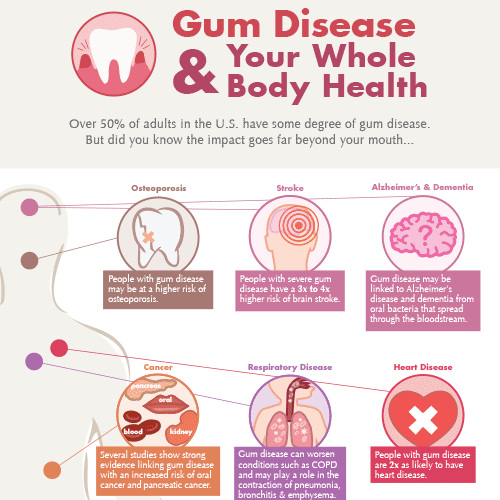A German study published in June 2008 in the Journal of Periodontology showed that people with RA had eight times the odds of developing gum disease as compared with people without RA. A study out of the University of Louisville in Kentucky published in September 2013 in the journal PLoS Pathogens found that the bacterium that causes periodontal disease, Porphyromonas gingivalis, increases the severity of rheumatoid arthritis, leads to an earlier onset of the disease, and causes symptoms to progress more quickly. And a Swedish study published in March 2016 in the journal Arthritis & Rheumatology suggests that P. gingivalis may be a possible trigger for autoimmune disease in a subset of RA patients.
gum disease as compared with people without RA. A study out of the University of Louisville in Kentucky published in September 2013 in the journal PLoS Pathogens found that the bacterium that causes periodontal disease, Porphyromonas gingivalis, increases the severity of rheumatoid arthritis, leads to an earlier onset of the disease, and causes symptoms to progress more quickly. And a Swedish study published in March 2016 in the journal Arthritis & Rheumatology suggests that P. gingivalis may be a possible trigger for autoimmune disease in a subset of RA patients.
How are Gum Disease and Rheumatoid Arthritis Linked?
Doctors may not know for sure how gum disease and RA are linked, but both diseases have inflammation in common, which may explain the connection. Inflammation is a protective immune system response to foreign bodies like viruses and bacteria. But with autoimmune diseases like rheumatoid arthritis, the immune system mistakenly triggers inflammation even though there are no viruses or bacteria to fight off, says Scott Zashin, MD, clinical associate professor of medicine at the University of Texas Southwestern Medical School and attending physician at Texas Health Presbyterian Hospital in Dallas. Dr. Zashin says it’s possible that the immune system is stimulated by mouth inflammation and infection, “setting off a cascade of events where inflammation develops at the site of joints or arthritis.” He says controlling the inflammation through better dental care could play a role in reducing the incidence and severity of RA.
Treating Gum Disease can make Rheumatoid Arthritis Better
Researchers at Case Western University found that when people with a severe form of rheumatoid arthritis successfully treated their gum disease, their pain and other arthritis symptoms got better. Patients who were treated with drugs for both gum disease and rheumatoid arthritis fared better than those who received RA medication alone. “People who have both gum disease and RA should have an informed care team comprised of both a physician and a periodontist,” says Dr. Griffin. “Brushing and flossing can be challenging for those with RA, and you should work with your doctors to find out what works best for you. And if you don’t have a periodontist, get an evaluation from your dentist every year to monitor the status of your gums, since you are more likely to get it.”

